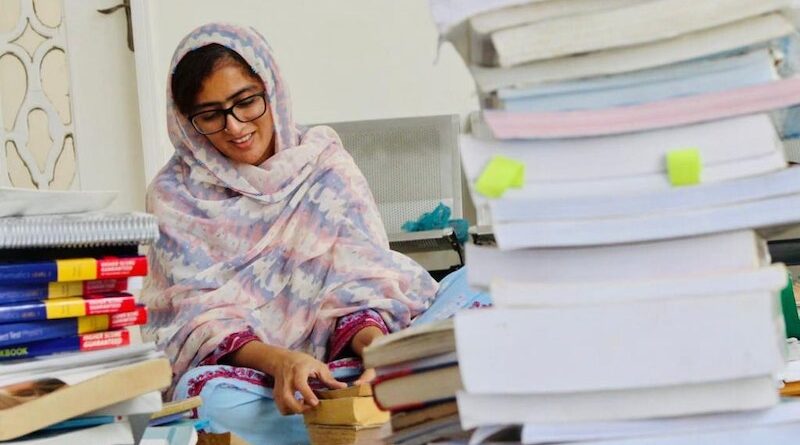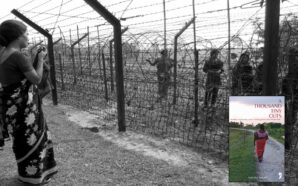Granaz Baloch, the founder of Turbat Hub-Global Shapers, is an educationist, water researcher, and climate change activist whose work is focused on education, clean water, sanitation, gender equality, and community development. She is one of the climate change activists featured in the book Climate Change Heroes by SOC Films in 2022. She studied Inorganic Chemistry at Sardar Bahadur Khan Women’s University, Quetta in the province of Balochistan - Pakistan and has an M.Phil. in Chemistry from the University of Turbat. She is also the founder and director of Udaan, an organisation that raises awareness about menstrual hygiene among girls and women in Gwadar and Turbat. When I spoke with her a few months ago, she was busy learning and practising the art of traditional Balochi embroidery in her hometown with her neighbours. She finds this experience enriching. She said, “I am working on a Balochi dress. I learned Balochi hand embroidery during COVID-19. It is interesting and helps me connect with the girls in my community. My neighbour's girls join me in this work. We discuss different issues during our work and bond over them. During this time, I am not Granaz Baloch, an activist or a person with followers on X (Twitter) but feel like an ordinary person, who is just stitching and enjoying her evening. It connects me to the people and ideas that have the power to impact perspectives.”
How’s the weather in Turbat?
Right now, it’s a little better!
More like Karachi?
No, it’s not like Karachi. Our city has harsh weather conditions, and most days it’s dry. Sometimes it’s cloudy, but mostly hot and dry without any sign of rain. Climate change has affected our weather patterns, making them more unpredictable.
What is your motivation to promote Climate activism, menstrual health, and equal rights?
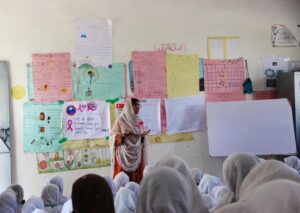 It is very personal. I am facing the issues firsthand. We do not have electricity at night and we have limited solar resources. So, I kept thinking about what we should do to change our circumstances because the temperature is rising. I am dealing with this and that is why I am more interested about it.
It is very personal. I am facing the issues firsthand. We do not have electricity at night and we have limited solar resources. So, I kept thinking about what we should do to change our circumstances because the temperature is rising. I am dealing with this and that is why I am more interested about it.
About menstruation, I live in an area where the temperature is 53-54 degrees Celsius and in winter, it can be as low as -1. How can I survive this? We are facing heat waves constantly. I need an environment where I can relax, but I do not have any alternative. My daily routine will never be going to change. I need to fulfil my duties as a woman, whether the temperature is 54 degrees Celsius or -1 degrees Celsius. Naturally, I care about its connection with gender and menstruation, as it is directly affecting me. People are suffering from this situation.
What is your opinion about Climate justice?
When people have more resources than they need, they exploit them. We cannot say that Global North is responsible for the Loss and Damage. We also have people among us who are responsible for forsaking the climate and causing loss and damage.
Why do you think we do not have enough awareness about Climate Change?
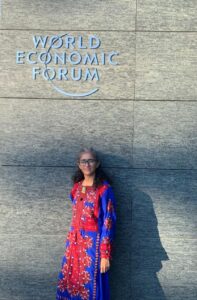 Our society does not want to speak about climate or gender rights. They do not have any benefits from these concerns. Our society needs education. Why don’t we have far-reaching education resources? We should be using books, illustrations, and readers for young students to educate them about climate change. Somebody who is living in Islamabad does not understand and knows about the heat waves of Turbat. People do not know that one of the reasons for the flood in Swat was unplanned urbanisation. Who will teach young students about the issues people are dealing with within different regions of Pakistan?
Our society does not want to speak about climate or gender rights. They do not have any benefits from these concerns. Our society needs education. Why don’t we have far-reaching education resources? We should be using books, illustrations, and readers for young students to educate them about climate change. Somebody who is living in Islamabad does not understand and knows about the heat waves of Turbat. People do not know that one of the reasons for the flood in Swat was unplanned urbanisation. Who will teach young students about the issues people are dealing with within different regions of Pakistan?
We do not have enough educational resources like textbooks, readers, and activity books on these important topics. The people who are developing curriculums do not represent small villages.
How do people respond to your work?
When I first started working, people did not wish to speak about climate change. As a teacher, I started this course “Climate Change and Us” at the Turbat University which is the first of its kind. Now, I am not teaching, but the course is still running. It is the third batch and almost 500 students took part in it. I am happy that even after I have left the university, teachers and students are working pursuing it and including more innovative activities. I think this is the power of sustainability. It has always been my focus, which is to create sustainable ideas and programs which can prosper even without me. It is a continuous journey. We were associated with many schools for this course. We also collaborated with Let’s Green Turbat. It is a campaign for the tree plantation in Turbat to protect its environment from rising temperatures. The thing is, it takes the local stakeholders and like-minded people, who can understand your vision and respect your values. It is not just to plant a tree; the important thing is to convey why it is required to plant a tree.
Tell us something about your organisation Udaan.
Yes! It is just a small effort of mine. I want to provide a platform to youth for capacity building and encourage them to think and explore opportunities out there. The last activity we have arranged under Udaan is the Balochistan Young Girls Summer Camp. It was an online activity organised by me.
I also feel proud of KECH Summer Camp. All the students who participated in that are now under-grade students. It was a simple pitch to the district administration to arrange a kid’s summer camp for the students. It was only for the government schools. Most of the time, people refuse to visit Turbat. But the response I got from my generous network was overwhelming. It was heartwarming to have this support from people. It was an exchange from Lahore to Turbat. Kanwal Khoosat came by herself to teach students. Mahim Maher came. Mahim’s generosity was inspiring. She did not even accept the airfare and supported the whole program. I cannot express my gratitude. They never complained about the hot weather or the unavailability of Air conditioning.
When I asked for funding from the district government, they asked me to arrange the summer camp in a government school. But I refused. I told them that we needed to show them universities. We need to let them dream of education. Now, these kids have been accepted to colleges, got international scholarships, and made waves in various programs, and I am proud of it.
The idea was to spark their interest to develop an interest in higher education. It did work. We chose 12 undergraduate fellows. Summer camp allowed students to connect with university fellows. It motivates them to pursue higher education in the future. We tried to promote networking and sustainable connections.
Why is it crucial to regain our position in society?
As women, we should take pride in our womanhood. The patriarchal narrative often causes us to question our worth. When women see themselves through the lens of patriarchy, they may view themselves as a curse.
We must actively discourage the notion that women are weak or inferior. In my community, I am known as a feminist. I earned this reputation because I do not tolerate the objectification of women. Sometimes, people assume that I am overly sensitive and will not tolerate any comments about women. However, this is not true. I am committed to standing up for what is right, even if it means confronting those who are being rude or disrespectful. We need to speak out and protest against such behaviour. If we allow people to disrespect us, it sets a precedent and becomes a norm.
Share a women’s empowerment moment that inspired you.
Throughout my career as a teacher and mentor, I have witnessed numerous moments of women’s empowerment. To me, empowerment emerges when women challenge societal norms and start living life on their own terms. Most people believe that if you have studied at a university and have a job, then you are empowered. I believe true empowerment goes beyond just working outside the home and being financially independent. It also involves having the freedom to take a breath and relax in a stress-free environment.
Do you consider yourself a changemaker?
No. I do not consider myself a changemaker. I just want to help students, especially girls, and encourage them to think out of the box and take stands. I think I did it, I am doing it, and I will continue my work. I am not teaching now, but people still reach out to me and ask for guidance. I consider it my responsibility to help people, even if no one can see it. I am not a changemaker. I am just trying to make a difference in the lives of people around me. My biggest reward is some of my male students, who are paving the way for their sisters to get an education. It is something I am proud of and strive for. People belonging to patriarchal conservative societies understand the importance of these developments.
Have you ever thought that your struggle never brings the desired change in society? How do you cope with these thoughts?
I am an optimist to the core. Even if I get a rejection email right now, I will shrug it off and move on to the next thing. There is always light after a night. I believe. I think my optimism is one of the reasons my students admire me.
What does the idea of ‘Women Empowerment’ mean to you?
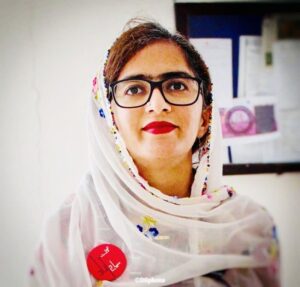 We think women’s empowerment is about education, getting a job, or driving a car. For me, it is to think freely, to write freely, to work freely, to speak freely, and to share freely. Everybody is earning money. But does everyone have the power to make decisions? We require this power to decide for ourselves to live independently, this is women’s empowerment for me.
We think women’s empowerment is about education, getting a job, or driving a car. For me, it is to think freely, to write freely, to work freely, to speak freely, and to share freely. Everybody is earning money. But does everyone have the power to make decisions? We require this power to decide for ourselves to live independently, this is women’s empowerment for me.
I have been told that I should be thankful for the education I received. It is an exclusive opportunity given by my parents, which I should be thankful for. Everyone ignored that it is my fundamental right, given by the Constitution of Pakistan and the UN Charter. I need the right to decide about my marriage and to make decisions about my life. Women’s empowerment is not only about education. Turbat has the highest literacy rate in Pakistan. But do we have the power to decide about our lives? Child marriage is common. Is this women’s empowerment? No.
What is your advice to young girls who want to raise awareness about the pressing issues in their society? They are bound to face cultural pressure, discrimination, and harassment. How can they deal with these issues?
The most important thing is to build your community. You are one today and will be two tomorrow. I have arranged many programs, but I never paid the speakers. Why? Because I build up communities. It is my work. It is your utmost duty to find yourself a community (online or offline). Second, share your values. Ask and answer questions. Why are you building a community? What are the shared values of your community? People get connected because of shared values. We get together today because we share the same values of commitment, love, responsibility, and women’s rights.
Mentoring is the second step in raising awareness. Take risks. If you want to bring change, you need to take risks. Otherwise, you cannot do anything. Fear of change can hinder your path but rise above it.
Then there is reading. Reading is impactful. Arrange reading circles. Speak and discuss issues and get knowledge. You need to remember that you can only change the system if you can change yourself. Take a stand for yourself, and then you can take a stand to change for your community.
What obstacles did you face as a woman in your career or education? How did you overcome them, and are you still fighting any?
I am the only daughter of my parents. Whatever stand I took, I took it for myself. But women in my surroundings have this impact that if I can do something, they can also. It motivates me and makes me think that this is not the life we want. We need to change our circumstances. As I said before, I do not give up. I change the narrative; I change tactics and tricks. I take a lot of risks sometimes. But I must do that if I have set my mind on something. You cannot imagine how difficult it is to stand up for myself, to demand respect, and to challenge the norms.
Education, Climate Change, Mental Health, Menstrual Hygiene, and Equal Rights. Global South and the world are starting to speak up about all, what’s next?
For the past few months, the suicide rate has been rising around here. We need to focus on this. It is concerning how youth will be responding to real-world issues. Some assume that blackmailing and mobile phones are the main reason for the sudden hike in the suicide rate. Parents’ behaviour is also considered a reason. Kids want more freedom, but they remain under the control of their parents. We also cannot ignore patriarchy which makes women depressed. Then there are concerns about mental health. It is high time to focus on mental health. We need to arrange the screening of young people to understand the cause of this situation.
What are your upcoming projects?
I have been working on climate preparedness in the local languages. Will share more details soon!
| Rapid Fire with Granaz Baloch
Which woman leader do you admire the most? There is no one particular name to mention. I am referring to all the women who are challenging patriarchy and changing perspectives across the globe. Who are the women authors that inspire you? Arundhati Roy. What are some of the ways to advance women’s rights? Give them freedom to think, believe, speak, and laugh in their own ways. Your three quick suggestions for students who want to do something about Climate Change. Start observing climate change from your home. Climate change is a jargon word but you can find its different version in surrounding your home or university. Follow the 3Rs: Reuse, Recycle, Reduce. Your favourite book(s)? Short stories of Anton Chekhov. Your hobbies? Colouring, listening to music, reading, creating X (Twitter) threads about travelling. Your favourite city? I don’t like cities. Describe your values in three words? Commitment, Humanity, Acceptance. |
Ananke’s Editorial Manager Pakistan, Nuzhat Nisar is an academic writer, editor, and translator. With over ten years of editorial experience, she is currently associated with Paramount Books as an editor, working on school textbooks and curricula. She studied Urdu, Mass Communication, and Education at the University of Karachi and has a Master’s degree in Political Science. She believes in promoting regional languages and equal opportunities in education and an avid supporter of equal rights for women. She also contributes to digital platforms as an independent journalist.
The interview has been lightly edited for clarity.




